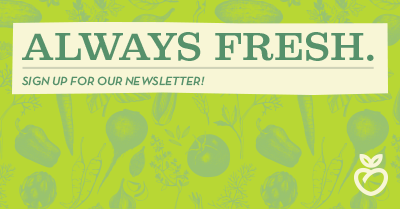Moving Away From Plastic Grocery Bags at Healthy Living
On June 15, 2015 Healthy Living will move away from plastic grocery bags at our checkouts. Plastic has a profound impact on our planet; everything from world politics to the health of the environment is affected, and as a company, we are committed to lessening this impact. Many cities in the US are undergoing efforts to ban plastic bags and we’re proud to continue the momentum of this effort.
Why are we getting rid of the plastic bags? Most plastic grocery bags, whether they’re recyclable, degradable, or otherwise, end up in landfills where it takes up to 1,000 years to be broken down, potentially leaking pollutants as they go. Since we currently go through approximately half a million plastic grocery bags each year, we feel like putting the brakes on this system is the right move to make for us, our community, and the global environment.
We’ll still offer paper grocery bags and encourage our guests to use fabric bags, both of which we feel to be more in line with our mission; paper bags are recyclable, reusable, and biodegradable and cloth bags are insanely reusable (plus, if they’re cotton, biodegradable to boot!). Perhaps we should take a moment to discuss these terms that are frequently tossed around when discussing shopping bags..
Recyclable: Bags that are recyclable are put through processes of mechanical and chemical breakdown to whittle them down to a usable form. This category includes paper bags (as long as they’re not modified with plastics) and SOME plastic bags which are only accepted by SOME locations (note: not the Chittenden County Solid Waste District). Generally, plastic shopping bags are actually a nightmare for the vast majority of recycling centers.
Reusable: Bags that are reusable are sturdy enough for multiple trips to the store. This category includes plastic (until they tear or wear out), paper (same issues), and cloth bags, as well as things like cardboard boxes. Naturally, cloth bags rate the highest for reuse-ability and are far and away the best option.
Biodegradable: Bags that are biodegradable will break down through the natural biological process of decomposition, the same way that apple cores, flower petals, and squash rinds do. These kinds of bags can be added to a compost pile and will ultimately become part of the rich substance that is lovely, lovely compost. This category includes paper and very special- and expensive- plastic bags typically derived from corn.
Degradable: Bags that are degradable are capable of being decomposed either chemically or biologically but it’s not the same as being biodegradable. They do degrade, but so will a car given enough time and the right conditions. Many, many years are needed for a degradable bag to totally break down. It is very different than a BIOdegradable bag.
Our paper bags are all of the above! You can reuse them for several shopping trips and when they’ve reached the end of their life, you can either easily recycle them (because we don’t add any plastics to them) or pop them in your compost (shredded up a bit first to speed things along) to biodegrade. (Did you know that it only takes about one month for a paper bag to biodegrade?! That’s some fast turn-around!)
We also want to remind our guests that any bag they bring from home gets them 5 cents off their purchase! And bringing your own reusablebag is the very best, greenest, most responsible way to get your groceries home! Thanks for your cooperation with this important mission.
In partnership with the Chittenden Emergency Food Shelf, we’re hosting a food drive on June 15th from 11a-2pm. Anyone who donates a non-perishable food item will receive a free Healthy Living reusable grocery bag.



